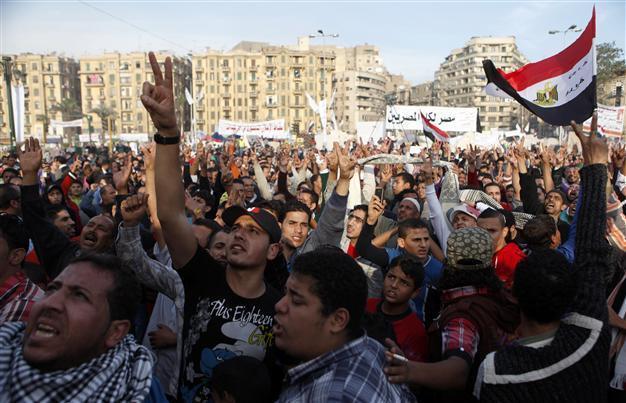Morsi forces referendum amid increasing protests
CAIRO

Anti-Morsi protesters chant slogans in Cairo. The president’s opponents continue their sit-in in Tahrir amid simultaneous marches by his supporters. REUTERS photo
As President Mohamed Morsi called on Egyptians to vote in a Dec. 15 referendum on the draft Constitution, Egypt’s top court suspended its work indefinitely yesterday to protest “psychological and physical pressures” after Morsi supporters prevented judges from entering the courthouse to rule on the legitimacy of a disputed constitutional assembly.The court’s decision is the latest turn in a worsening crisis pitting Morsi and his allies against the mostly secular opposition, The Associated Press reported. The standoff began when Morsi issued a package of decrees on Nov. 22 that gave him sweeping powers and extended immunity from the courts to a panel tasked with drafting a new Constitution. The Islamist-dominated panel then raced in a marathon session last week to vote on the new charter without the participation of liberal and Christian members. The fast-track hearing preempted a decision expected from the court Dec. 3 on whether to dissolve the committee, a ruling the judges postponed the same day.
Morsi announced on Dec. 1 a referendum on the draft charter for Dec. 15, despite opposition protests and questions about the document’s legitimacy. After Morsi’s speech, hundreds of his supporters gathered outside the Supreme Constitutional Court in south Cairo ahead of yesterday’s verdict. Hundreds more marched along the banks of the Nile towards the courthouse.
Blackest day: Court
“It is the Egyptian judiciary’s blackest day on record,” the court said, describing the scene outside the court where Islamists carried banners denouncing the tribunal and some of its judges. Supporters of Morsi claim that the court’s judges are loyalists of ousted president Hosni Mubarak, who appointed them to their positions, and are trying to derail Egypt’s transition to democratic rule.
The court statement said the judges approached the court but decided against entering the building as they feared for their safety. “The judges of the Supreme Constitutional Court were left with no choice but to announce to the glorious people of Egypt that they cannot carry out their sacred mission in this charged atmosphere,” it said.
The judges were also expected to rule on the legitimacy of the Islamist-dominated upper house of Parliament, known as the Shura Council. By suspending its work, the court joined Egypt’s highest appeals court and its sister lower court in their indefinite strike to protest what they see as Morsi’s infringement on the judiciary. Most judges and prosecutors have been on strike for a week.
















